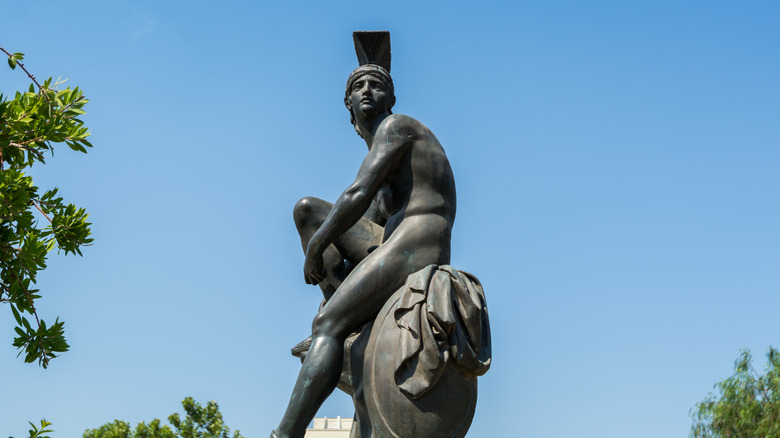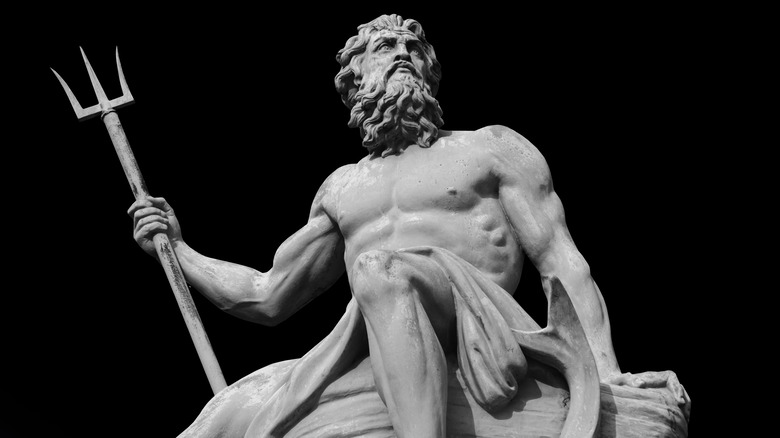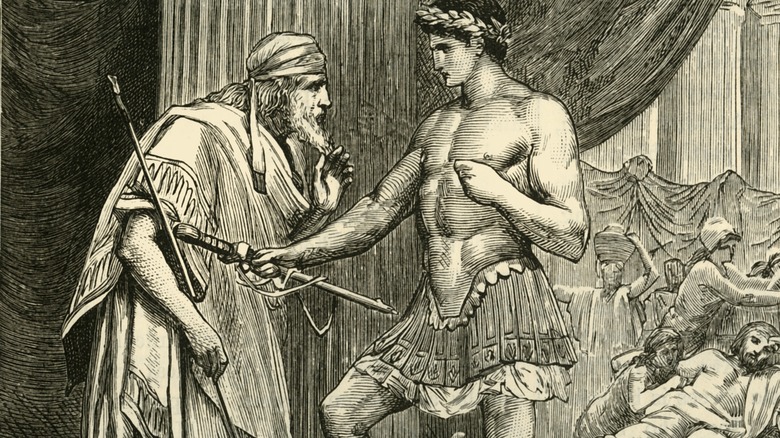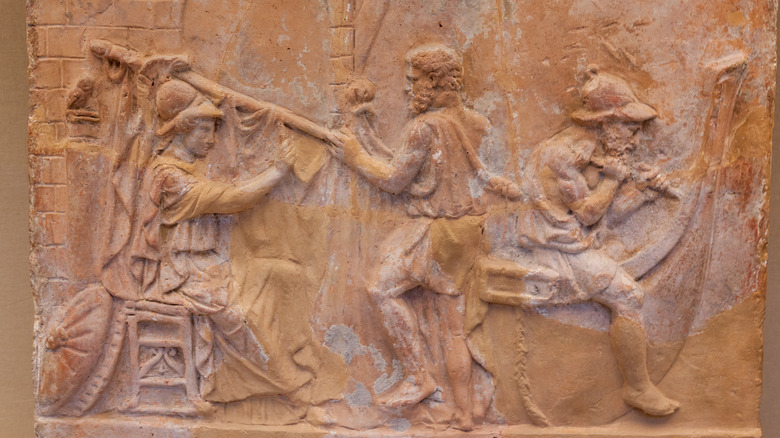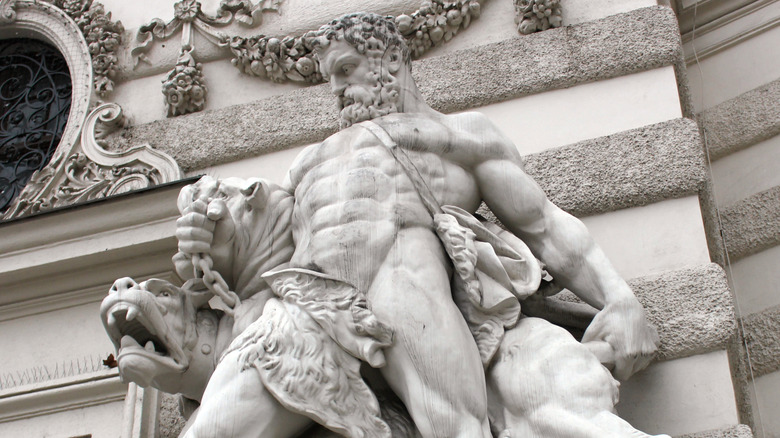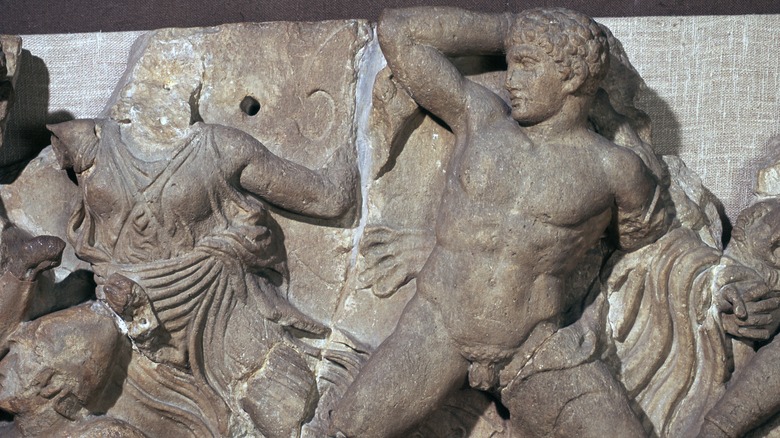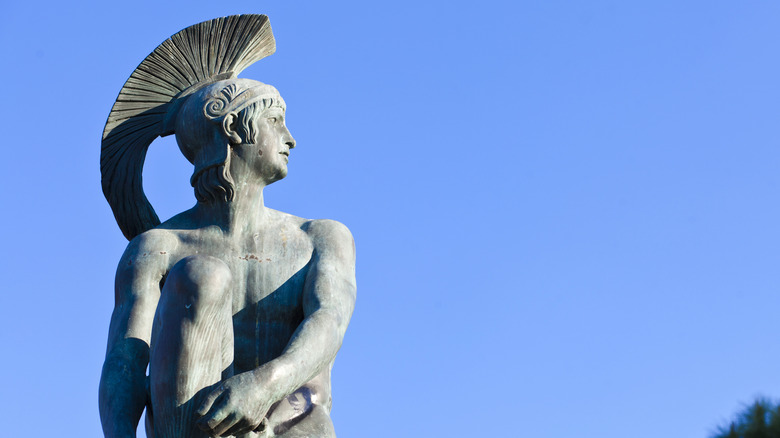Fascinating Facts About Theseus, The Greek Mythological Hero
To call someone a "hero" is pretty self-explanatory. That hero must have done some remarkable things — perhaps saved some lives, lived honorably, or been a positive role model in some way. In that sense, it seems a bit of a misnomer to call famous Greek warriors such as Theseus and Perseus "heroes." While they were certainly warriors who excelled in a society that treasured warriors like nothing else, they weren't always the most upstanding of individuals.
Sure, there are exceptions. Heracles did some pretty great things, and he rid the world of some awful evils. Perseus did the same, slaying Medusa. But what often gets swept under the rug is what else they did. The same problem exists with the Greek gods. They've been so cleaned up and Disney-fied over the centuries, that most people with a casual understanding of Greek mythology will only mention that Zeus threw lightning bolts, and perhaps that he defeated the Titans. Sounds pretty heroic, so long as you ignore the fact that he was the most morally bankrupt sentient being to have ever "existed."
It figures that a mythological society ruled by such gods would cultivate such heroes as Theseus. He may be remembered almost entirely for slaying the Minotaur of Crete, but other aspects of his life, sewn into the myths that bore him, were much darker, more devious, and downright dirty. It's no wonder he traces his lineage to someone like Poseidon, who, while no Zeus, committed his fair share of atrocities. Here's a look at some fascinating facts you might not know about Theseus.
He had two fathers
Nowadays, having two fathers is perfectly normal. But for Theseus, his "having two fathers" is not what you'd think of in modern times. He also had a mother, so, all told, he had three parents. While that's certainly confusing on the surface, it's pretty par for the course for Greek mythological origin stories. Let's not forget that Dionysus was born from Zeus' thigh, per Britannica.
Anyway, back to Theseus. The story goes, according to Theoi, that King Aegeus of Athens — Theseus' mortal father — wasn't convinced that Theseus was his son. Maybe it was the boy's superhuman strength, but whatever the reason, Aegeus set up a test, hiding his sword, shield, and sandals under a giant boulder that Theseus would have to move in order to return the items to Aegeus if he was truly his son. Of course, the only reason Theseus was able to move the boulder was because he was a demigod of Poseidon's lineage, but apparently that bit didn't matter to Aegeus. If anything, he might have been relying on it.
Of course, Theseus moved the boulder and returned the belongings to his human father, and somehow this validated his kinship to both Aegeus and Poseidon. His mother, meanwhile, was Aethra, who raised Theseus. She made it quite clear to him that he had two fathers, yet there is no further explanation how both fathers contributed to the birth of a single son.
He cheated against the Minotaur
Every Greek hero has a crowning achievement. Perseus killed Medusa, Bellerophon rode Pegasus, Odysseus had a literal odyssey of challenges, and Theseus? He killed the minotaur. Per the World History Encyclopedia, the whole shtick with the Minotaur was that King Minos of Crete would take Greeks from Athens and feed them to the Minotaur in the Labyrinth. Which, granted, is pretty awful. So in comes Theseus, pretending to be a sacrifice himself, intent on taking down the Minotaur. While he did end up accomplishing that, and it was a momentous victory, it was not by his own strength or cunning.
According to an article by Charles Seltman in The South African Archaeological Bulletin, King Minos' daughter Ariadne fell in love with the strapping Theseus, and saw to it that he was more prepared than any previous sacrifice when he went into the Labyrinth. She met him at the entrance and gave him two things that would prove vital to his quest: a sword and a giant spool of thread.
With the sword, he was able to kill the Minotaur, but that was only half of the trouble. Getting out was the other half, and in order to do that, he used the spool of thread that Ariadne had given him and followed it back out the way he came. Mission accomplished. So, yes, Theseus did the world a service by preventing King Minos from sending more innocent civilians to their deaths, but he wouldn't have been able to do it without the cheat code provided by Ariadne.
The Minotaur wasn't his only bullish encounter
You may think that a hero need only slay one nefarious bull in order to solidify his place as a bonafide man-of-miracles like Theseus, but just to be safe, Theseus killed two. The Minotaur that is synonymous with his legacy was the second one. The first was that pesky fire-breathing bull of Marathon. According to Theoi, the story begins with Theseus returning to Athens to claim his birthright: the throne. His father had, at this point, grown old and more than a little senile, so he didn't recognize Theseus as his son. His current wife, Medea the sorceress, had her own son to usher onto the throne, so she wanted to send Theseus to the quickest death possible.
According to The American Journal of Archaeology, Medea forced Theseus into hunting down the fire-breathing bull of Marathon, which is a task many lesser heroes had already died trying to accomplish. But naturally, Theseus being Theseus, he succeeded in his task and brought the bull back to his father to be sacrificed. It was then that Medea threw all caution to the wind and attempted to poison her frustratingly heroic step-son. She also may have tried to get him ambushed by giants, according to The MET Museum.
None of it goes according to plan, and Medea is banished. You'd think that Theseus lived happily ever after, but that's rarely ever the case in ancient Greek mythology.
He probably abandoned Ariadne on Naxos
Next to Heracles and Perseus, Theseus is one of those Greek heroes who is so famous for feats of strength and bravery that his everyday antics, including his family life, often get ignored. And let's just say that Theseus was far from a family man. Perhaps he had too much hero-ing to do to raise a family or deal with the thrumming heart of love, but regardless, his dating record was not exactly upstanding.
Take, for instance, how things ended up with Ariadne, without whom he likely would have been just another victim of the Minotaur of Crete. She gave him the sword and the giant spool of thread to ensure his victory, and in return? She gets abandoned by Theseus. At least, that's according to one version of the myth, as recounted by The Collector. Of course, like most Greek myths, there are many variations. Those alternate versions include defying a god, accidental separation, tragedy at sea, a Romeo and Juliet-esque narrative, and more.
But the variation that is by far the least flattering to Theseus is that he made a pit stop on Naxos, ditched Ariadne, and sailed on back to Athens. But don't feel too badly for Ariadne, because in that version, she ends up happily married to Dionysus, and Theseus, no matter how you spin his death, does not end up in such a happily-ever-after.
Theseus may have been an actual historical king, too
The fun thing about ancient Greek myths and legends is that it's often hard to separate historical fact from folklore. Now, granted, you can probably hazard a pretty safe bet that satyrs and centaurs and minotaurs weren't real, but there are those who would disagree. Regardless, though, this blurs the lines between ancient Greek historical figures and their mythological counterparts. For instance, did Heracles really exist, and how much of his story was glamorized?
The same goes for Theseus. But of all the Greek heroes, Theseus may be the most likely to have actually existed. For starters, consult any list of the rulers of Athens (such as this one from California State University Northridge), and you will see Theseus' name right where it ought to be. What likely contributed most to the popularity of his mythology, according to The MET Museum, are the parallels between Theseus' supposed accomplishments and historical attempts to democratize Athens. As a result, he began appearing on countless ancient Greek artifacts, such as vases and other pottery.
It's easy to accept that he was a king, so if nothing else, that's a pretty solid takeaway. Whether you think he dispatched a bunch of evil bulls, well, that's up to you.
He was an Argonaut
There are a lot of buzz words that even someone not deeply embedded in ancient Greek mythology will recognize, and "Argonauts" is one of them. Think of the Argonauts as a heroic dream team, almost like the Justice League or the Avengers. Every hero has their own exploits, but put them together and you get a fighting force that's pretty incredible. The Argonauts were a who's who of Greek heroes, consisting of everyone from Heracles to Jason, and naturally, Theseus counted himself among their ranks. Apparently it was a really good time to be a Greek mythological hero, because everyone else was one, too.
Although, according to ThoughtCo., not every list of the Argonauts includes Theseus — another example of discrepancies across differing versions of the same myth. That said, the biggest quest the Argonauts undertook was Jason's hunt for the Golden Fleece. According to the World History Encyclopedia, Theseus participated in said quest, though his name does not get headlined; after all, this was Jason's adventure. This story is one of the most famous from Greek mythology and may have been inspired by actual historical events, per the World History Encyclopedia.
Whatever the case, it was just another notch in the belt of our vaunted hero Theseus, who always found time to help out other heroes on various misadventures that sometimes got him into trouble. This wasn't one of them.
He had to be rescued by Heracles
Theseus assisted Jason in finding the Golden Fleece, and according to the World History Encyclopedia, he also managed to help Meleager slay the Caledonian Boar without much backfire. But there was one quest that didn't go so well for Theseus, and it would have ended much worse if not for his dear cousin Heracles, the undefeated champ of being an ancient Greek hero.
Theseus had a really close friend by the name of Pirithous, and apparently the two were enamored with each other from the first time they met — just a prototypical ancient Greek bromance. Well, Pirithous decided to set his bar pretty high for one particular quest, seeking to steal on down to the land of the dead and take Persephone, Queen of the Underworld, out from under Hades' nose. If you're thinking that this sounds more dangerous than a rogue boar or a mean bull, you'd be right. They were both captured, according to Britannica, and if not for Heracles, Theseus' story may have ended right there. But Heracles did the sporting thing and plucked his cousin from the literal bowels of hell.
And Pirithous? Well, he wasn't so lucky. According to the Cambridge Philological Society, surviving fragments of an ancient Greek tragedy about Pirithous claimed he was still wasting away in Hades, effectively abandoned by the other half of his bromance. It's not like Theseus has a history of leaving behind people he supposedly cared about, though. Just ask Ariadne.
Theseus had a complicated relationship with the Amazons
As with just about every Greek myth, this is a story that has many variations, some flattering to Theseus, and some the complete opposite. After ditching Ariadne (depending on the version of the myth you subscribe to) and returning to Athens to be king, Theseus realized he needed a wife, since he had left his other one behind. According to Theoi, he set his sights on the ruler of the Amazons, a civilization of formidable women who "lived at the outer limits of the known world" (per the World History Encyclopedia).
When he went to them, he immediately fell in love with Hippolyta, the queen of the Amazons. He wooed her, the same way he might have wooed Ariadne. Now, depending on which version of the myth you prefer, he either wooed her but was amicably denied, since Hippolyta couldn't leave her people; or she was abducted by Theseus and rescued by the Amazons in Athens before she could marry him; or they were married, had a kid, and lived happily ever after.
Pirithous tried to steal Theseus' cows
There are a great many ways that a friendship can begin, but it's a pretty safe bet that no one's friendship began like that of Theseus and Pirithous. Though they would become nearly inseparable later in life, things didn't begin all that well for the two. In fact, Pirithous was up to no good prior to meeting his future bromantic interest, and had decided to have a go at some of Theseus' cows, according to Britannica.
As he was driving them away to take for himself, he was caught by Theseus — the latter being a demigod at all — but rather than face judgment, he faced the man who would essentially become his best friend. The story goes that Theseus was so enamored by Pirithous, and vice versa, that they shook off the whole cow incident, probably forgot the cows entirely, and swore to be brothers from that moment forth.
Of course, Pirithous was later trapped in Hades while Theseus was spirited away by Heracles, but hey, it was fun while it lasted.
Theseus' end is very ... anticlimactic
When you think about the entire body of mythology surrounding Theseus, it's no wonder such a large sample of Greek pottery depicts him. He slayed not one, but two menacing bulls that needed a good slaying; he was an Argonaut alongside his cousin Heracles; he was always up for helping a fellow hero out on their own quest; and he was the honest-to-goodness King of Athens. So you'd have to imagine that as far as deaths go, his would be something good. Either heroic, or kingly, or maybe even both.
Or ... how about neither? And not just neither, but how about the complete opposite? According to Britannica, after ditching Pirithous in Hades, Theseus returned to Athens — which, granted, took quite some time — and found a revolt in progress that he could not put down. Taking emergency, last-ditch measures, he sent his children away to safety while he fled to Scyros, cursing the Athenians the entire way. It appeared that he would live out his days in exile. And, technically, he did, but his days were numbered. The King of Scyros, Lycomedes, was worried that Theseus was eyeing the throne of Scyros, since he had lost the throne of Athens. Rather than wait around to see if he was right, he pushed Theseus off a cliff.
And that's it.
